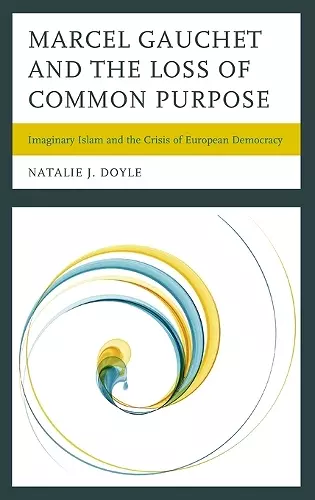Marcel Gauchet and the Loss of Common Purpose
Imaginary Islam and the Crisis of European Democracy
Format:Hardback
Publisher:Bloomsbury Publishing PLC
Published:20th Dec '17
Currently unavailable, and unfortunately no date known when it will be back

This bookexplores the work of Marcel Gauchet, one of France’s most prominent contemporary intellectuals, to examine the contemporary crisis of European democracy. It does so by examining the threats from ideological co-radicalization associated with the combined impact of economic crisis and Islamic fundamentalism. It locates Gauchet’s ideas in the context of French intellectual history and notes the significant influence upon it of the social and political theories of Cornelius Castoriadis and Claude Lefort and its reaction against those of Foucault. The book reviews the entire scope of Gauchet’s writings, from the early publications to the most recent publications on the “new world” of neo-liberal individualism, economism, and globalization. The book reveals how Gauchet’s work overcomes many of the misunderstandings affecting current discussions of controversial topics including the European Union, the nation-state, political Islam, the paradoxes of democracy, secularization, and reactionary political movements. It highlights the need for European societies to rediscover their political underpinnings: their capacity to invent a new collective future starting from the nation-state and to adapt to a new mode of international relations on a global scale. To do so, and to counter the threat of radicalization, they must retrieve the lost common purpose encapsulated in the notion of democratic sovereignty.
Natalie Doyle’s study offers a provocative account of what she diagnoses as a “loss of common purpose” in contemporary French political debates by reconstructing the critical itinerary of Marcel Gauchet, a former gauchiste leader at a provincial French university in May 1968, whose encounter with a professor, Claude Lefort, led him to join also with Cornelius Castoriadis to transform the critique of totalitarianism into a positive theory of radical democracy. Now the editor of the monthly journal, Le Débat, an established historian and regular political commentator, Gauchet has—for good or for ill—recast the French intellectual stage. How did the former leftist-anarchist become an authority whose writings are taken seriously by all corners of the political spectrum? Natalie Doyle’s searching study presents a comprehensive analysis of Gauchet’s intellectual itinerary whose suggestive conclusions about the contemporary crisis of European democracy open new horizons. -- Dick Howard, SUNY, Stony Brook
Marcel Gauchet´s work is the most comprehensive and sophisticated interpretation of modern democracy; but in the English-speaking world, it has been neglected and overshadowed by much less meaningful constructions of “French theory.” Natalie Doyle's book is the first substantial discussion of Gauchet's theories in English, and so far the most extensive published anywhere. It contains an in-depth analysis of the French intellectual background, as well as reflections on the implications of Gauchet's work for the current European crisis. The book is essential reading for all those interested in broad historical and theoretical perspectives on democratic societies. -- Johann P. Arnason, La Trobe University
Natalie Doyle throws new light on some of the most intractable questions of our times, while providing the most informative account of the work of Marcel Gauchet available in English. Like Gauchet, Natalie Doyle avoids the narrow perspectives that tend to shape current discussions and instead reveals the longer historical background to pressing contemporary concerns. Natalie Doyle’s stimulating and illuminating analysis will be of major interest to everyone concerned with political implications of religious belief today, the prospects of democracy, French intellectual history, and the potentials for theoretical and practical innovations that will enable us to recognize and move beyond our current incapacity to formulate a common purpose. -- Craig Browne, University of Sydney
Natalie Doyle’s book is an exhaustive and brilliant piece of research into the writings of Marcel Gauchet, but beyond that, it is a pedagogically articulated work on intellectual life in France since the 1960s. A major innovative side of the book concerns the internal ties between the thoughts of Marcel Gauchet, Claude Lefort and Cornelius Castoriadis. Until now, at least in the English speaking world, this affinity had not been comprehensively discussed and convincingly shown in reference to their mutual texts. On the other hand, Doyle makes a laudable effort to uncover the intricacies of Gauchet’s work in regard to Foucault. In the crisis of democracy to which Gauchet has dedicated many books, the role of Islam as an imaginary factor plays a double role: as an indicator of the crisis and as a new challenge for the secularization process as well as the role of religion in 21st century Europe. Gauchet’s leaning towards laïcité as a French intellectual is brought into the open by Doyle, critical of some of his tenets in this regard. -- Farhad Khosrokhavar, École des Hautes Études en Sciences Sociales
ISBN: 9781498519175
Dimensions: 237mm x 159mm x 25mm
Weight: 558g
294 pages